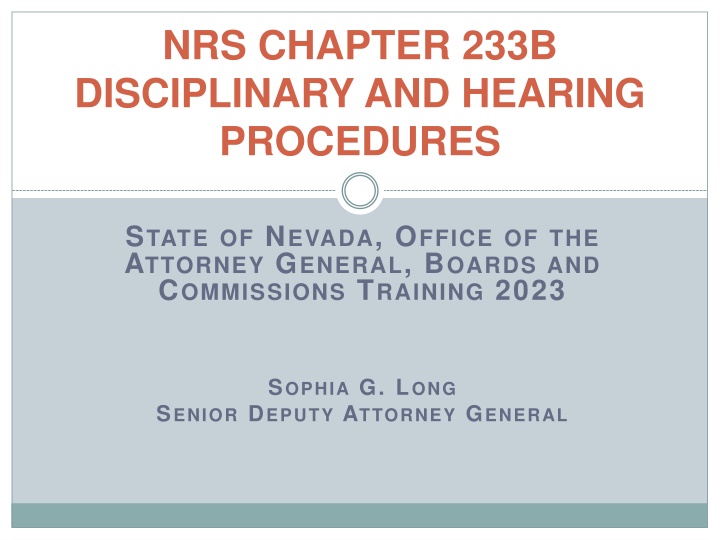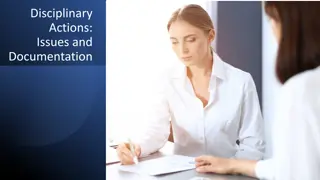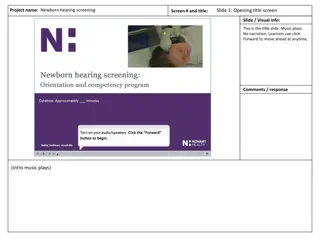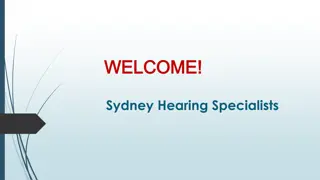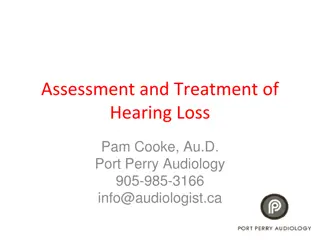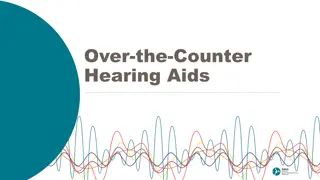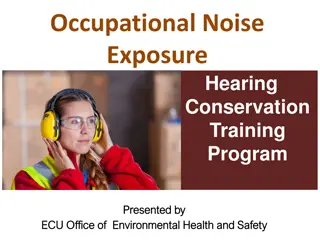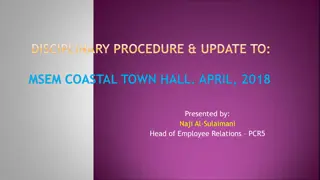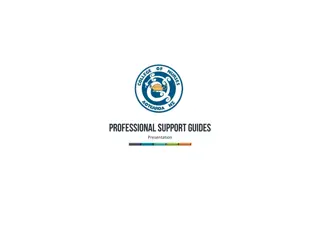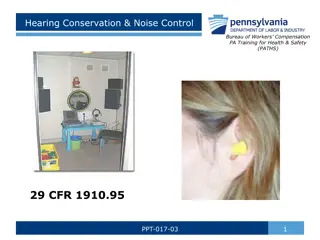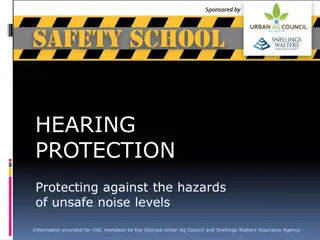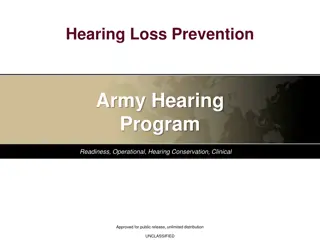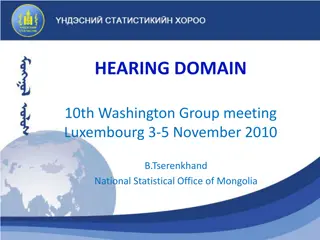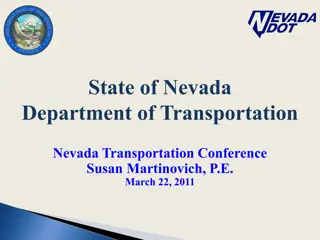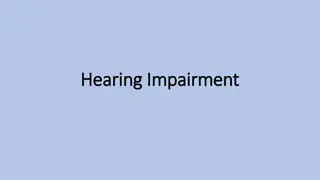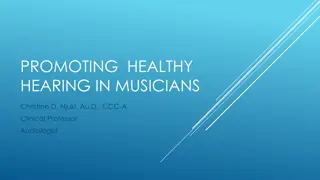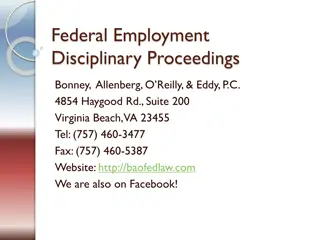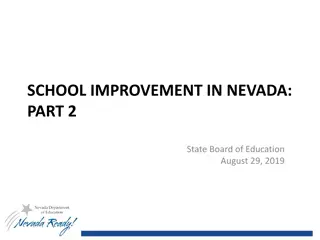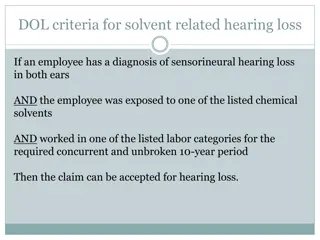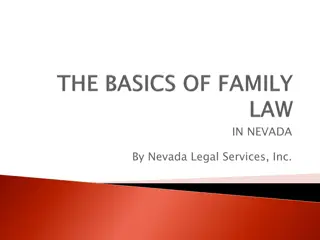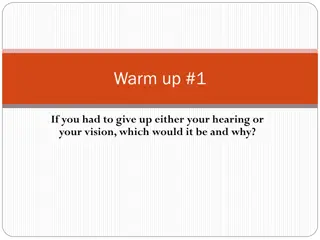Key Disciplinary and Hearing Procedures in Nevada State Agencies
Overview of the disciplinary and hearing procedures as outlined in NRS Chapter 233B, emphasizing the requirements for contested cases, constitutional issues relating to due process, and the importance of providing reasonable notice to individuals involved. The content covers the essential components of notice, including time, place, legal authority, and jurisdiction requirements, along with specific provisions for different types of cases.
Download Presentation

Please find below an Image/Link to download the presentation.
The content on the website is provided AS IS for your information and personal use only. It may not be sold, licensed, or shared on other websites without obtaining consent from the author.If you encounter any issues during the download, it is possible that the publisher has removed the file from their server.
You are allowed to download the files provided on this website for personal or commercial use, subject to the condition that they are used lawfully. All files are the property of their respective owners.
The content on the website is provided AS IS for your information and personal use only. It may not be sold, licensed, or shared on other websites without obtaining consent from the author.
E N D
Presentation Transcript
NRS CHAPTER 233B DISCIPLINARY AND HEARING PROCEDURES STATE OF NEVADA, OFFICE OF THE ATTORNEY GENERAL, BOARDS AND COMMISSIONS TRAINING 2023 SOPHIA G. LONG SENIOR DEPUTY ATTORNEY GENERAL
Contested Case A proceeding in which the legal rights, duties or privileges of a party are required by law to be determined by an agency after an opportunity for hearing, or in which an administrative penalty may be imposed. NRS 233B.032. Requirements for contested cases are set by the Nevada Administrative Procedures Act (APA) in Nevada Revised Statutes (NRS) Chapter 233B. All title 54 agencies are also subject to the requirements in NRS Chapter 622A unless exempted. See NRS 622A.120.
Constitutional Issues A state issued license to practice a profession carries a constitutionally protected property interest. Gilman v. State Board of Veterinary Medical Examiners, 120 Nev. 263, 269, 89 P.3d 1000,1004 (2004). Due Process clause prevents the state from depriving an individual of his protected property interest without a fair trial in a fair tribunal. In re Murchison, 349 U.S. 133, 142 (1955).
Due Process Due process of law is required whenever the state deprives a person of life, liberty, or property. U.S. Const. amend. XVI, 1; Nev. Const. art. 1, 8. Requires reasonable notice to the Respondent, which informs him/her of the pending legal and factual issues, An opportunity for a hearing, including the opportunity to present evidence, call witnesses, and cross-examine opposing witnesses. (NRS 233B.121), and An impartial adjudicator presiding over the hearing.
Contents of Notice Notice must include: (A) A statement of the time, place and nature of the hearing. (B) A statement of the legal authority and jurisdiction under which the hearing is to be held. (C) A reference to the particular sections of the statutes and regulations involved. (D) A short and plain statement of the matters asserted. NRS 233B.121(2)
*Reasonable Notice* Reasonable notice required. NRS 233B.121; NRS 622A.300; AB52 (2023) Certified mail. 14 calendar days to the last known address of licensee. NRS 241.033(2)(a)(2) and NRS 241.034(1)(b)(2). Personal delivery. 7 calendar days. NRS 241.034(1)(b)(1). Attorney. Personal delivery 7 calendar days. NRS 241.034(1)(b)(2). Sending an extra copy by regular mail.
Check for Specific Notice Provision For example, in Real Estate Division cases, a licensee must be given at least 30 days notice in writing. Must give the date, time and place of the hearing, A copy of the Complaint; and Copies of all relevant documents in the Division s possession. Must be served in person or by certified mail to last known address. NRS 645.680. Virtual hearings update AB219
Summary Suspensions If the agency finds that public health, safety or welfareimperatively require emergency action, and incorporates a finding to that effect in its order, summary suspension of a license may be ordered pending proceedings for revocation or other action. Such proceedings must be instituted and determined within 45 days after the date of the order unless the agency and the licensee mutually agree in writing to a longer period. NRS 233B.127(3).
Summary Suspensions Is there a threat to the public health, safety or welfare that is so imperative that an emergency action is required? Factual allegations are egregious, public is at risk now without action, and factual allegations are supported by evidence. Summary suspensions should be rare. License will be suspended without notice or full hearing. Potential to create liability for the State. Underlying hearing on the merits must be held within 45 days. NRS 233B.127(3).
Opportunity for Hearing Requires opportunity to: Present evidence in support of legal position. Call own witnesses. Introduce exhibits. Cross-examine opposing witnesses. Present argument on all issues. Right to counsel (NRS 622A.310(1))
Impartial Adjudicator Requires: No investigator or prosecutor may take part in the fact-finding and decision. No ex parte investigations by board members. NRS 233B.122, 233B.126 Stivers v. Pierce, 71 F.3d 732, 741-42 (9th Cir. 1995). Ethical rules preclude the participation of a person who has an interest in case. NRS 281A.420 If one member of an adjudicating body is actually biased, or where circumstances create the appearance that one member is biased, the proceedings violate due process. Stivers v. Pierce, 71 F.3d 732, 741-42(9th Cir. 1995).
Pre-Hearing Resolutions (1) Stipulation of Fact Partial resolution, facts are stipulated, but not violations of law or pentaly. Stipulation of Facts and Liability Partial resolution, facts and violations of law are stipulated, but not penalty. Stipulation for Settlement Full resolution of matter. Facts, violations of law, and penalty are stipulated. MUST BE APPROVED IN A PUBLIC MEETING. SETTLEMENT AGREEMENTS ARE PUBLIC RECORD. NRS 622.330
Pre-Hearing Resolutions (2) Voluntary Surrender of License in Lieu of Other Disciplinary Action. This is discipline. See NRS 233B.121(6). Licensee surrenders license and is no longer an active licensee. Can be considered a revocation wherein the licensee agrees. Generally, other penalties not imposed due to return of license. Should include a period of time after which licensee may re-apply for licensure as a new applicant. Not required to grant licensure. See NRS 622A.410. Temporary Voluntary Surrender of License Pending Hearing. Usually done after first continuance, if a second continuance is requested.
Pre-Hearing Motions (1) Request for continuance Practice has been that each side automatically gets one continuance Why? To ensure due process is given Counsel has conflicts To get counsel Witnesses not available Heavy caseload
Pre-Hearing Motions (2) Request for Discovery/Depositions Courts have upheld decisions of administrative adjudicators which have denied discovery or depositions to be taken Administrative hearings are less formal Depositions and other discovery, more typically used in court actions is costly and time consuming NRS 622A.330 permits list of witnesses and documents to be exchanged, but no depositions or interrogatories without permission from the regulatory body Subpoenas
Prepare for the Hearing Review Complaint, Notice of Hearing, Answer Evidence is not provided until hearing Do not do independent investigation or research concerning the allegations Do not prejudge the case. Wait until you ve heard the evidence and arguments. Review statutes and regulations Determine what issues are going to be decided Do you have authority to decide issues raised? Who has the burden of proof?
Burden of Proof for Contested Cases Board s case must be proven by preponderance of the evidence. Preponderance of the evidence means evidence that enables a trier of fact to determine that the existence of the contested fact is more probable than the nonexistence of the contested fact. NRS 233B.0375. NRS 233B.121(9), NRS 233B.125, NRS 622A.370. Findings of fact must be based exclusively on a preponderance of the evidence. Nassiri v. Chiropractic Physicians Board, 327 P.3d 487 (2014).
FTA/Default Respondent fails to appear for hearing and a continuance has not been requested or granted. Prosecution makes an offer of proof regarding service of Respondent with charging document. Determination made by fact-finder that proper legal notice was provided to Respondent. Matter heard and decided in Respondent s absence. Fact-finder may accept all allegations in charging document as true. See NRS 622A.350.
Opening the Hearing Introduce public body members present. Call case name. Indicate the date, time, and place of hearing. Set out order of presentation. Indicate that the hearing is on the record or that it is being recorded. Have parties note appearances for the record. HEARING OUTLINE.
Opening the Hearing (continued) Ask for any preliminary motion, issues or stipulations? Swear in witnesses. Every witness is required to declare by oath or affirmation that he/she will testify truthfully. NRS 233B.123(3). Court reporter. Interpreter. Do you solemnly swear that you will interpret the following questions from English into (Language) and the answers from (Language) into English to the best of your ability Sequester witnesses, if requested. NRS 622A.380. Be prepared if virtual hearing!
Order of Hearing Opening statements The Prosecutor goes first: Calls witnesses; Introduces exhibits; Opposing party may then cross-examine. When parties have completed questioning, the Adjudicator may ask questions of the witness. NRS 622A.380.
Introduction of Evidence RELIABILITY is the key. Is the evidence sought to be introduced reliable? Each type of evidence is sufficient to make a finding. NRS 233B.123; NRS 622A.370. Testimony by witnesses Witness must be competent, i.e., personal knowledge. Hearsay? Documents Copies are allowed, use certified copies if possible; self authenticating. Opposing party can request to review original. Virtual hearing issues? Tangible objects
Exclusion of Evidence May exclude: Irrelevant, immaterial or unduly repetitious evidence. Privileged communications Attorney/client, physician/patient, husband/wife.
Credibility of Witnesses Consider all the evidence How do you decide if a witness is credible? Does the story make sense? Bias/interest in outcome. Demeanor. Great deference is given to adjudicator s credibility determinations by reviewing Court. Every decision should include a discussion of credibility.
Hearsay Defined Hearsay is an out of court statement offered to prove the truth of the matter asserted. Witness testifies Joe told me the car was red. This is hearsay evidence that the car is actually red. This statement is admissible but, by itself, it is insufficient to establish the color of the car. There must be additional evidence corroborating that car is red if that is an issue that needs to be proven in the case.
Hearsay Hearsay is generally admissible in administrative hearings. However, a party may not rely on hearsay evidence to supply a critical element of his case. There must be corroborating evidence. Biegler v. Nevada Real Est. Div, 95 Nev. 691, 695, 601 P.2d 419, 422 (1979). Evidence must consist of more than hearsay.
Objections The President or Chairperson makes the ruling on any objections during a hearing Sustain Agree with objection, evidence will not be admitted. Overrule Disagree with objection, evidence will be admitted. Note objection for record
Record on Objections Require party making objection to state reason why evidence should not be admitted. Allow opponent to state why evidence should be admitted. Seek assistance from counsel if needed.
Ex Parte Communications Unless required for the disposition of ex parte matters authorized by law, members or employees of an agency assigned to render a decision or to make findings of fact and conclusions of law in a contested case shall not communicate, directly or indirectly, in connection with any issue of fact, with any person or party, nor, in connection with any issue of law, with any party or his representative, except upon notice and opportunity to all parties to participate. This is why public comment is not allowed for pending cases until those cases are heard and decided by the body. NRS 233B.126; NRS 622A.340.
Post-Hearing Deliberations Once the parties have introduced their evidence and made closing arguments the Board needs to determine whether substantial evidence establishes that the Respondent has committed the violations of law alleged in the complaint.
Post-Hearing Substantial Evidence Evidence is that which a reasonable mind might accept as adequate to support a conclusion. State Employment Sec. Dep t v. Hilton Hotels Corp., 102 Nev. 606, 608 (1986). A violation may be established by circumstantial evidence.
Post-Hearing Record of deliberations Before taking a vote on the alleged violations, the Board should discuss the evidence which they believe establishes or doesn t establish that a violation occurred. If particular documents or testimony weighs toward a particular finding that evidence should be discussed on the record. If particular witnesses were credible that should be discussed on the record.
Post-Hearing Deliberation process A motion that some, all or none of the violations alleged in the Complaint have been proven can be made. It will vary from case to case what makes the most sense. Go through the alleged violations one at a time. Go through multiple or all violations. Can be considered in one motion.
Discipline Imposed Hold a full discussion on the record of reasons for particular discipline imposed. Consider the seriousness of the violations. Consider previous discipline. Other similar cases Discipline in accordance with your statutes. May be: Public Reprimand. Fines. Probation. Suspension or revocation. Other (check your statutes!)
Cost Recovery Authorized Boards may recover from a person reasonable attorney s fees and costs as part of its investigative, administrative and disciplinary proceedings against the person if the regulatory body. NRS 622.400 Fees and costs itemized statement review Necessary, reasonable and actually incurred. Costs recovered must be the actual amount expended and a true reimbursement to the agency. Not permitted to disguise a fine by calling it costs. Costs are often important for licensing boards to reimburse the board for actual costs expended on the case. Fines are deposited in the general fund, but costs are retained by the board as reimbursement.
Revocation of a License NRS Chapter 622A requires that if a license is revoked, the Order prescribe a period of time during which the Respondent may not apply for reinstatement of that license. The prescribed period must be at least 1 year but not more than 10 years. NRS 622A.410.
Reasoned Decision Must include: Findings of Fact. Must include concise and explicit statement of the underlying facts supporting the findings. Facts supporting decision must be in the record and must be supported by a preponderance of evidence. Conclusions of Law Both must be stated separately. See NRS 233B.125.
Reasoned Decision Adjudicator should determine both the findings and the conclusions. Decision must be in writing or stated in record. Served by personal service or certified mail. BEST PRACTICE: Also served by regular U.S. mail, even if no statutory requirement to do so. Within statutory time limits; under chapter 622A, time allowed is 60 days. NRS 622A.380(l).
Duties of Adjudicator in a Hearing Responsible to develop full record. NRS 233B.121(7). Includes: All pleadings, motions and intermediate rulings, Evidence received or considered, A statement of matters officially noticed, Questions and offers of proof and objections, and rulings thereon, Proposed findings and exceptions, and Any decision, opinion, or report of the of hearing officer Explain reasoning for a decision on the record.
Appeal to Board or Other Public Body Some agencies allow Respondents to appeal decisions rendered in contested cases to the Board or other public body, if that body was not the fact- finder. See NRS 641.325. Exhaust administrative remedies
Judicial Review Must be filed within 30 days after service of the final decision. NRS 233B.130. Confined to record of hearing. NRS 233B.135. Burden of proof on the party attacking the decision. Disciplinary Order is not stayed unless the party files a Motion for Stay and such Stay is granted by the Court. NRS 233B.140. Motion for Stay must be filed at the same time the Petition for Judicial Review is filed. NRS 233B.140(1).
Judicial Review Court considers whether decision: Violates constitutional or statutory provisions, Exceeds agency s statutory authority, Made upon unlawful procedure, Affected by legal error, Is clearly erroneous in view of reliable, probative and substantial evidence in the records, or Is arbitrary, capricious, or characterized by abuse of discretion, i.e., was the decision based on evidence from which a reasonable person could draw the same conclusion? NRS 233B.135.
